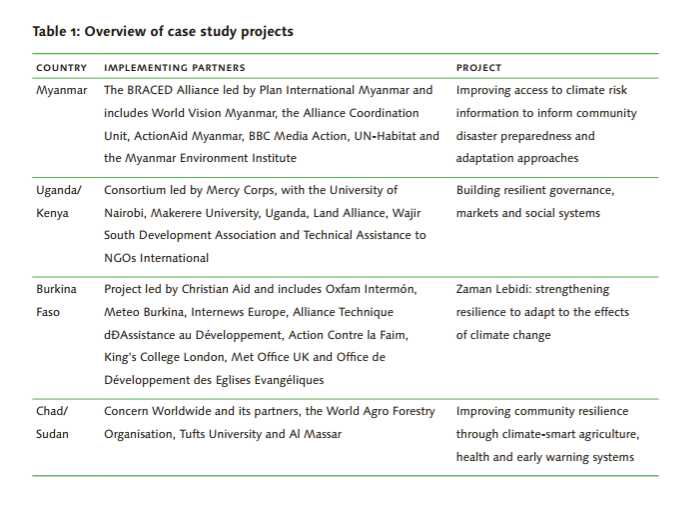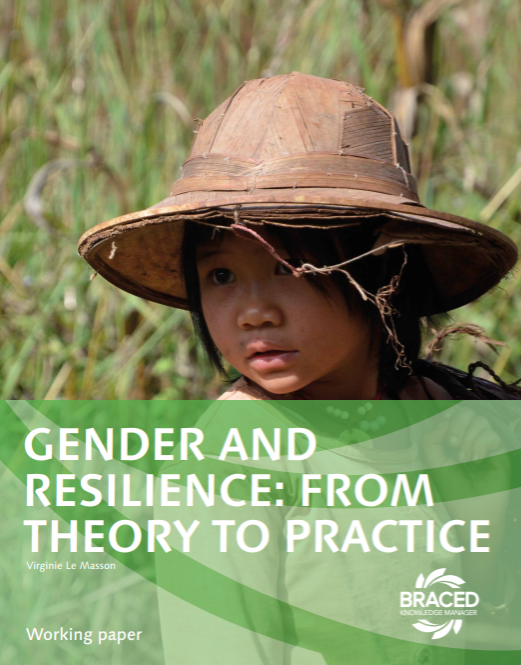The Overseas Development Institute, one of the UK’s leading think tanks, recently released a working paper titled Gender and Resilience: from Theory to Practice. The paper is a synthesis of four different case studies, documenting how gender equality can be strengthened through resilience projects. It draws on the experiences of the project Building Resilience and Adaptation to Climate Extremes and Disasters (BRACED), one year after implementation.
BRACED is a program funded by the UK Department for International Development (DFID). The project was targeted to help the people of the Sahel, East Africa, and Asia to better adapt to the effects of climate change. The program aims to:
- Secure, service, and promote trans-border livestock mobility across the Sahel,
- Share skills and technology to improve uptake of climate information in Ethiopia,
- Support smallholder farms in Nepal to take advantage of economic opportunities and invest in climate-smart technologies,
- Build new approaches to knowledge and learning and to influence policies and practices at the local, national, and international level.
The report examines four different case studies, in Myanmar, Uganda and Kenya, Burkina Faso, and Chad and Sudan. The projects worked with many different partners on:
- Improving information available on climate risks with adaptation approaches and disaster preparedness [Myanmar, Burkina Faso]
- Building resilient markets, governance, and social systems[Uganda/Kenya]
- Improving community resilience through climate-smart agriculture, health, and early warning systems [Chad/Sudan]

The report methodology used “writeshops” to conduct research. Writeshops involved the participation of researchers, NGO staff members, policy-makers, farmers, students – anyone involved in the experiences being documented – so as to produce a written output that understands the project more holistically. Each participant contributed his or her own knowledge by drafting a paper and then reviewing the work of others to establish a strong base of many opinions for the project. This is done with the support of facilitators, editors, and logistical staff members.
The writeshop method was pioneered by CLD Movement member, the International Institute of Rural Reconstruction, and has since been adapted by many other institutions, such as the International Fund for Agricultural Development (IFAD) and the International Institute for Environment and Development. BRACED’s Knowledge Managers hope to conduct writeshops twice a year to create publishable research pieces covering different dimensions of resilience-building.
All four studies examined in the ODI Report found that social and cultural norms discriminate against women and girls in a number of ways. Women on average work longer days than men and are paid lower wages. In West Darfur, women work 12-14 hour days while men work 8 hours during cropping season and 4-5 hours per day for the rest of the year. In Myanmar, the estimated annual income for women was $630, and $1,043 for men. Women’s literacy rates continue to be lower than men’s, and women have less control over their rights, entitlements, and resources.
The ODI Report also found that women are significantly less involved in decision-making processes than men, both within households and at the community level. In BRACED’s participatory assessment surveys (BRAPAs) in Burkina Faso, less than 50% of women interviewed felt that they were able to participate in household decision-making, with 27% of respondents saying they did not participate at all.
These inequalities are further exacerbated by the rapidly changing climate. In each of the four cases, women are confined to agricultural roles where crops are increasingly difficult to cultivate and yields are poor. Due to traditional gender roles, females are unable to diversify their livelihood and grow different crops. As climate change reaches extremes as time passes, women are more likely to be impacted significantly as a result, particularly in the four aforementioned target areas assessed.
BRACED offers many recommendations for implementing partners, the BRACED Knowledge Managers, and donors. These include ensuring that projects do not perpetuate instances of social inequality, combating gender-based violence with resilience-building interventions, and sharing knowledge and experience between practitioners with the field experience and the donors and policy-makers involved to ensure a sound community-led approach.
Regardless of the barriers that NGOs face, BRACED concluded that the four case studies require that increased attention is paid to further gender and resilience programs. At the international level, donor commitment is key. The report commends DFID’s requirement for empowering women to be included in proposals. Without it, the Myanmar study would have likely taken a more gender-neutral approach. At the national level, NGOs must collaborate with other like-minded organizations, including UN agencies and community-based organizations and networks. Additionally, advocating for sound policies will be crucial to help support initiatives, such as a law in Uganda encouraging the participation of women in politics.
Most importantly, at the organizational level, a combination of rules and incentives promote a greater emphasis on gender and resilience. The case studies found that it is important to gain the approval and commitment of the senior management in the country, that gender equality must be embedded in the project’s theory of change, and that existing practices must be drawn from in order to achieve success. The case studies additionally identified key members of NGO teams, working specifically on gender empowerment to act as a driver towards its success. For instance, Concern had a special gender representative for BRACED’s project in Myanmar. With these factors in place at each level the project has a greater chance at success, and increases the likelihood that women will be empowered in that community in the future.
To review the full BRACED report, visit http://www.braced.org/. BRACED conducts additional projects in Myanmar, Nepal, and throughout the Sahel region, with the specific intention of prepare people in need to be more resilient to climate extremes. DFID funding for BRACED has been awarded as 3-year grants for 15 projects. Further project summaries, such as in Niger, Mali, and South Sudan can be found here.


